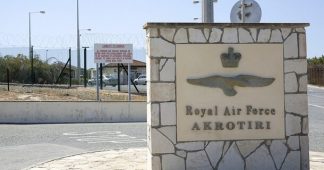The treaties of 1960 that allegedly established an allegedly independent Republic of Cyprus were never intended to allow a central government of Cyprus to behave independently. This because these treaties were predicated on keeping the Soviet Union out of the Eastern Mediterranean as much as possible. The whole arrangement was therefore based on the British bases. The fact that Cyprus became a member of the United Nations was based on the treaty of Establishment. The trouble is that the whole package of treaties (also of ‘Alliance’ between Greece, Turkey and Cyprus, and of ‘Guarantee’) reflected illegality, essentially because of the Treaty of Guarantee. Why? Because the Treaty of Guarantee was in contravention of the United Nations Charter. Even the Foreign Office Law Officers recognised in 1967 that the treaty contravened Article 2.4 of the United Nations Charter, and was completely overridden by Article 103.[1]
And since the three treaties were interdependent, they were all tainted. As regards the Treaty of Establishment, perhaps rather farcically, over half of it was devoted to the British bases. It is significant that before the London conference, Makarios was not even allowed to participate at the Zurich conference. As for the inevitable breakdown of 1963, the Foreign Office actually helped Makarios to draft his thirteen amendments to the constitution:
We have been through the 1963 papers, which tend to confirm that the Thirteen points were indeed framed with British help and encouragement; that the then High Commissioner considered them to be reasonable prospects; and that our intention was to promote their acceptance by the Turks.[2]
In 1964, the British admitted that the constitution was unworkable:
There is no hope of re-establishing the Constitution which was destroyed at Christmas. A radical change is inescapable.[3]
Then, obviously realising that the 1960 ‘arrangement’ had proven inadequate:
The only two solutions which would bring peace and order to Cyprus are enosis or the establishment of a unitary Republic dominated by its Greek-Cypriot majority.[4]
In 1975, the FCO referred to an ‘unstable constitutional agreement’.[5]
It is clear that the whole 1960 arrangement was a rushed job, imposed on the people of Cyprus, and that the illegal aspects were simply ignored, but admitted later on.
The USSR was reasonably happy to vote for Cyprus’s membership of the UN on 23 August 1960 (SC resolution 155), since it knew that there would be problems for NATO’s Southern flank.
In 1975, the FCO wrote:
Given our decision not to use military force in Cyprus and the relatively small amount of pressure that we can bring to bear on Cyprus, Greece and Turkey, this puts us in the invidious position of having responsibility without power. This has brought us no advantages whatsoever and it must be in British interests for us to work for a solution which will not involve Britain in any guarantee obligations or other lasting commitments over Cyprus. Such a solution is however remote and will be particularly difficult to achieve as long as we retain a physical presence in the Bases.[6]
More ominously, the FCO also wrote:
We should also recognise that in the final analysis Turkey must be regarded as more important to Western strategic interests than Greece and that, if risks must be run, they should be risks of further straining Greek rather than Turkish relations with the West.[7]
Finally, let us finish this brief paper with another FCO quote, from 1975, which shows how legally farcical the whole 1960 package is:
One implication of the current Turkish Cypriot constitutional moves, and specifically of Denktash’s confirmation to me that they regard the post of President and Vice-President as having lapsed, is the extent to which the whole 1960 Treaty apparatus be held to have lapsed […] we […] continue to regard the 1960 constitution as still in practice operative, despite the various derogations by both Greek and Turkish Cypriots since 1963. But the Turkish side is in effect saying increasingly openly and firmly that the 1960 constitution is defunct. They are, of course, freely having their cake and eating it by applying the view only when it suits them.[8]
More damningly, some days after the above was written, an FCO legal adviser wrote:
It is not, however, open to the Turkish Government to pick and choose between the various parts of the 1960 Treaty apparatus as it suits their purposes […] the Turks cannot rely on the collapse of the Constitution in order to justify intervention for the purpose of re-establishing the state of affairs established by the basic Articles of the Constitution and, having intervened with that aim, then ignore that aim because the Constitution has lapsed.[9]
A final FCO quote from before the Turkish ivasion demonstrates the obvious relationship between the British bases (now NATO/American in all but name) and the legal shakiness of the ‘1960 apparatus’:
[…] The various 1960 agreements […] constituted an integral settlement, in effect a package deal. The abandonment of our position on the Treaty of Guarantee would thus undermine our position on the rest of the 1960 settlement. In particular, it might one day be found to have prejudiced our position on the Treaty of Establishment as well. c) Even though our title to the Sovereign Base Areas does not depend on the Treaty of Guarantee or the Treaty of Establishment, the express provisions in those Treaties concerning the Sovereign Base Areas may still be of value to us in ensuring our untroubled occupation and use of the Areas. Moreover, anything which called the 1960 settlement as a whole into question could expose us to pressure on our moral (as distinct from legal right to hang on to the Areas. d) Whether or not we have a direct interest in maintaining the Treaty of Guarantee, we could not openly abandon it without gravely upsetting Turkey.[10]
The same things return with different colours. It is clear that the Zurich agreements and the resulting ‘treaties’ were at best built on very shaky legal foundations, and at worst were actually illegal, as began to be recognised after 1963.
William Mallinson, 20 January 2017
Copyright Dr. W.D. E. Mallinson
Professsor of Political Ideas and Institutions, Universita degli Studi Guglielmo Marconi
————————-
[1] Mallinson, William, Cyprus, A Modern History, I.B. Tauris, London and New York, 2005, 2009, 2010 and 2012, p. 55, NA FCO 27/166/MF/10/41.
[2] Ibid., p. 35. NA FCO 9/1353, file no. WSC 1/1.Book also available in Greek, published by Papazissis, Athens, 2005.
[3] Mallinson, William, Britain and Cyprus: Key Themes and Documents since World War II, I.B. Tauris, 2011, p. 29, NA FO 371/174770, file CE/2254.
[4] Ibid.
[5] NA FCO 46/1248, file DPI/516/1.
[6] NA FCO 46/1248, file DPI/516/1, ‘ British Interests in the Eastern Mediterranean’, paper prepared by South East European Department, FCO, 11 April 1975. Also translated and published under the title Pikres Elies by Estia, Athens, 2010.
[7] Ibid.
[8] Ibid., p. 101, Olver to Goodison, 4 March 1975, NA FCO 9/2159, file WSC 1/7, part B.
[9] Ibid., p.101, Batstone to Jones, 21 March 1975.
[10]Op. cit., Cyprus: a Modern History, p. 93, Steele to Fearn, 10 February 1971, NA FCO 9/1374/, file WSC3/548/5.










